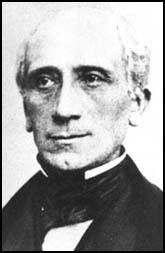Thomas Maunoir

Thomas Maunoir was born in Geneva in 1806. After studying medicine in England and France, he became a surgeon in Geneva. He was also a member of Geneva's Board of Health and the Geneva Society for Public Welfare, an organization dedicated to social reform. Members were concerned with improving both the morals and material lives of working people. This included building a house of industry, a society for the improvement of working-class housing and the establishment of a children's playground.
In 1862 Henri Dunant sent Gustave Moynier, president of Geneva Society for Public Welfare, a copy of A Memory of Solferino. In the book Dunant stated that his intention was to promote the "adoption by all civilized nations of an international and sacred principle which would be assured and placed on record by a convention to be concluded between governments. This would serve as a safeguard for all official and unofficial persons engaged in nursing war victims."
Gustave Moynier went to see Dunant and invited him to a special meeting on 9th February, 1863, of the Geneva Society for Public Welfare. Dunant told the fourteen people who attended that he wanted to form an organization that sent volunteer nurses to the battlefield. He also wanted to improve the methods of transporting the wounded and the care they received in military hospitals.
After the meeting it was decided to form an International Committee for Relief to the Wounded. Guillaume Dufour was to be president while Maunoir, Henri Dunant, Gustave Moynier, and Louis Appia agreed to serve as board members. This eventually became the International Committee of the Red Cross.
In 1864 the five men organized an international conference of 13 nations in Geneva to discuss the possibility of making warfare more "humane". At the end of the conference on 22nd August, 1864, the representatives signed the Geneva Convention. The agreement provided for the neutrality of ambulance and military hospitals, the non-belligerent status of persons who aid the wounded, and sick soldiers of any nationality, the return of prisoners to their country if they are incapable of serving, and the adoption of a white flag with a red cross for use on hospitals, ambulances, and evacuation centres whose neutrality would be recognized by this symbol.
The campaign then began to persuade the different countries to ratify the Convention. It was approved by Belgium, Denmark, France, Italy, the Netherlands, Sweden, Norway, Spain and Switzerland in 1864. They were followed by Britain (1865), Prussia (1865), Greece (1865), Turkey (1865), Austria (1866), Portugal (1866) and Russia (1867). Thomas Maunoir died in 1869.
